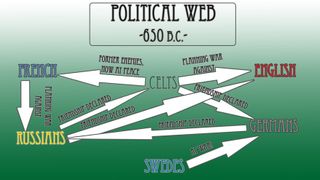
Alliances shift
825 B.C.: England and Russia declare friendship.
Interesting. This means attacking England will probably strain my relations with Russia... but they're half a world away, and I've got the French (who aren't big fans of the Russians) between me and them. Oddly enough, my relations with the French are swiftly improving at this point.
That same year, a messenger from the Swedes arrives to express their leader's displeasure with the Celts' continued relations with Germany.
775 B.C.: England proposes a declaration of friendship with the Celts. Once again, the Celts make up something about how they're just super busy right now, and maybe they'll get back in touch later.
Later that year, Sweden asks for aid in a war against Germany. The Celts, still on good terms with the Germans, decline the offer.
650 B.C.: A Celt engineer discovers, albeit a bit late, that circles are pretty awesome for moving things around. His name? Wheelos McWheely.
Excellent, now I can start connecting my cities with roads and forming trade routes. This will pull my economy out of the aqueduct, and grant me bonus Science thanks to one of my religion bonuses. I just hope it isn't too late to save myself from being left in the technological dust.
PC Gamer Newsletter
Sign up to get the best content of the week, and great gaming deals, as picked by the editors.
At Midsummer, the chieftains of the Celtic tribes gather and decide to adopt a system of government in which every voice is counted. That is, assuming you own land, are a native-born Celt, and no one has accused you of barbarian sorcery. (It's not even 500 B.C., progressivism still has a ways to go.)
This was a HUGE decision in terms of strategy. I had the choice of adopting Tradition, which would lead me to foster a small, tight-knit empire, or Liberty, which would consign me to pushing for more cities, more citizens, and continued expansion of my borders. Mostly because of the map size and the fact that I spawned on a vast, open landmass, I went with the latter.
As Celtic freemen are enjoying their new level of representation, the Swedish-German Wars break out far to the East.
Most Popular



